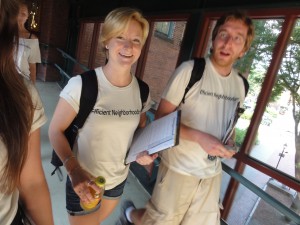
The referenced media source is missing and needs to be re-embedded.
In Massachusetts, Clean Water Action's canvass is rolling out a new energy program we helped create. Using targeted outreach and improved financial incentives, this program will expand home weatherization to families who have previously faced barriers to making their homes more efficient. Building a Brighter Day, a report from our partners at Community Labor United, shows the astounding benefits of our combined advocacy: if fully implemented, the program could weatherize 2200 homes, avert 84,000 tons of greenhouse gas emissions, save $59 million for Massachusetts residents and continue improving the wages for weatherization workers by bringing $42 million back to our communities. And that’s just part of the picture.
In 2013, Clean Water Action entered into a fifth year of partnership with community-based groups and organized labor through the statewide Green Justice Coalition (GJC). This innovative cross-sector effort is built on a solid foundation of trust. It was established after the creation in 2008 of the Green Communities Act—a massive public investment in energy efficiency programs. When it became apparent that low-to-moderate income residents, renters, non-English speakers and other large segments of our communities didn’t have fair access to the benefits of home efficiency, despite paying into the system, we knew we had to collaborate to expand the reach of the state’s programs.
Through cooperation and simply listening to one another, we realized that protecting our environment also meant moving forward on labor and community issues like job quality and affordable housing. We fought for, and won, strong Responsible Employer Standards in efficiency contracts, and carried out pilots to demonstrate the effectiveness of grassroots outreach in “Hard-To-Reach” and “Hard-To-Serve” communities. This year, the utilities managing the program for the state agreed to create a special initiative targeting moderate-income residents with extra incentives as a means to address the barriers the GJC identified. Called Efficient Neighborhoods Plus (EN+), the new program lowers the barriers to participation for many by in effect recognizing a new middle category of ratepayers between low-income and well-off.
 To celebrate, Clean Water is taking the Green Justice party on the road. Alongside local partners, we aim to reach over a dozen communities statewide with the campaign’s lessons, especially the notion that we are stronger when we cooperate with the big prize in mind, rather than scrabbling for short-term wins that often divide us. We’ve held successful events in New Bedford and Brockton, with more coming up with community groups, efficiency contractors, municipal officials and other stakeholders in Worcester, Lowell, Malden, Fall River and others.
One of Clean Water Action’s key partners, Community Labor United, has just released a report, Building a Brighter Day, detailing the lessons learned and unprecedented victories through the Green Justice campaign. The report also monetizes the impact of efficiency measures that reduce pollution, lower bills and bring jobs to our communities. The results are astounding, with thousands of tons of pollution averted, millions of dollars returning to working families and incredible gains for community health.
Finally, we’ve shown the power of the grassroots. Weeks after EN+ went into effect, Clean Water Action’s canvass is helping to roll out the program in the community of West Springfield. Work remains–we're still fighting for access to information that would allow us to better serve all communities--but we’ve come full circle in the fight for Green Justice. Clean Water Action and our partners are continuing to advocate for energy equity. We're bringing the benefits of the green economy right to the doors of Massachusetts residents.
To celebrate, Clean Water is taking the Green Justice party on the road. Alongside local partners, we aim to reach over a dozen communities statewide with the campaign’s lessons, especially the notion that we are stronger when we cooperate with the big prize in mind, rather than scrabbling for short-term wins that often divide us. We’ve held successful events in New Bedford and Brockton, with more coming up with community groups, efficiency contractors, municipal officials and other stakeholders in Worcester, Lowell, Malden, Fall River and others.
One of Clean Water Action’s key partners, Community Labor United, has just released a report, Building a Brighter Day, detailing the lessons learned and unprecedented victories through the Green Justice campaign. The report also monetizes the impact of efficiency measures that reduce pollution, lower bills and bring jobs to our communities. The results are astounding, with thousands of tons of pollution averted, millions of dollars returning to working families and incredible gains for community health.
Finally, we’ve shown the power of the grassroots. Weeks after EN+ went into effect, Clean Water Action’s canvass is helping to roll out the program in the community of West Springfield. Work remains–we're still fighting for access to information that would allow us to better serve all communities--but we’ve come full circle in the fight for Green Justice. Clean Water Action and our partners are continuing to advocate for energy equity. We're bringing the benefits of the green economy right to the doors of Massachusetts residents.
(Live in Massachusetts? You can take action for Green Justice right now)
The referenced media source is missing and needs to be re-embedded.
Related Posts
Stay Informed
Get the latest updates and actions:
Thanks for signing up!
There was a problem processing your signup. Please try again.


